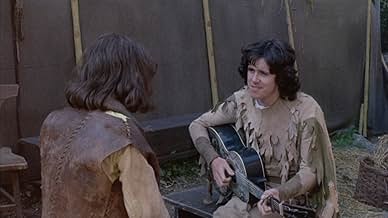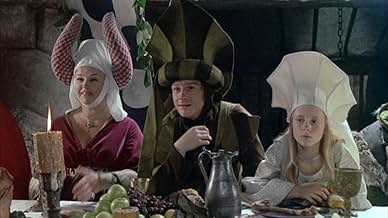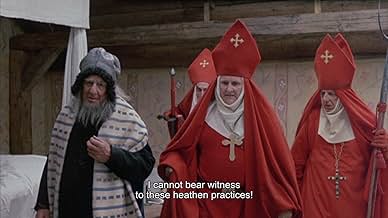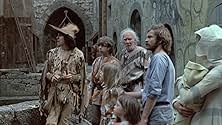NOTE IMDb
6,3/10
1 k
MA NOTE
En 1349, alors que la peste noire menace l'Allemagne, une troupe de saltimbanques arrive dans la ville de Hamelin qui se prépare au mariage de la fille du bourgmestre avec le fils du baron.En 1349, alors que la peste noire menace l'Allemagne, une troupe de saltimbanques arrive dans la ville de Hamelin qui se prépare au mariage de la fille du bourgmestre avec le fils du baron.En 1349, alors que la peste noire menace l'Allemagne, une troupe de saltimbanques arrive dans la ville de Hamelin qui se prépare au mariage de la fille du bourgmestre avec le fils du baron.
- Réalisation
- Scénario
- Casting principal
Avis à la une
The bubonic plague often began with the death of the rats before it spread to the people. This movie's version of the pied piper seems far closer to the origin of the story than anything else I've seen.
Watching this recently, I remembered certain scenes from when I watched it as a child of about 7 or 8, some twenty-five years ago. That is testament to how effective some of The Pied Piper is. Indeed, in some ways it hardly qualifies as a "childrens' film" at all, as it starts with a picture of a heretic being burned at the stake and ends with the death of one of the main characters by the same means. Clearly Demy had Bergman's The Seventh Seal in mind for the general feel of the film, which stresses the irrationality and brutality of the times. However, the screenwriters and Demy add another ingredient - the political chicanery of the Church, the aristocracy and the merchant class, sometimes colluding together, at other times each promoting their own special interests. It's not difficult to read the film as a quasi-Marxist parable about feudal society, and the film-makers clearly intended something of the sort. If that makes it all sound very heavy, actually the film is fairly fast-moving and fun, especially because of the wonderfully comic grotesque playing of Donald Pleasance and Roy Kinnear. Fans of these actors should definitely seek this film out - Pleasance is as good as he was in "Death Line" (AKA "Raw Meat") made about the same time, and Kinnear is nearly as good as he was in "Juggernaut", another overlooked but very interesting British film of the early 70s. There is also a very good performance from Michael Hordern as the rationalist alchemist, one of his better and most substantial but unfortunately least known performances. Nostalgia fans can also take pleasure in remembering a time when Jack Wild, made famous by "Oliver", was considered a star. The Pied Piper deserves its mixed critical reputation. Demy does not here have the firm control over his material he had in earlier films. The main flaw is the total lack of characterisation of the Piper, and the terrible non-acting of the folk singer Donovan in that role. His musical interludes are just embarrassing and the worst thing about the film (for a similar ruining of a otherwise thoughtful historical film by a miscast singing star, see 1969's "Where's Jack?" with Tommy Steele). This is a pity as the socio-political stuff at the edges of the film, plus the costumes and scenery, are very good indeed. Overall, this is certainly worth a watch if it turns up on TV or you might, as I did, seek it out on a secondhand VHS cassette. It is not a major film but it's an endearing oddity, and certainly a must-see for Demy students or fans of Brtish film in the early 70s.
Grimm Brothers tale of a strolling minstrel in 1349 Germany who agrees to rid the village of Hamelin of plague-carrying rats is given a serious, perhaps overly-solemn treatment. Jacques Demy has directed the story in a straightforward fashion, without any humor or playfulness, mystery or beauty (with the exception of the sunrise-heightened finale). Pop singer Donovan is well-cast in the title role, and his music compositions are good even if his songs are not of the Medieval period. The other cast members--top-billed Jack Wild, Donald Pleasance and John Hurt--have very little to do; Wild, in particular, is forced to painfully hobble around with a crutch as an alchemist's assistant. Michael Hordern as Melius, who is unable to conjure a cure for the Black Death and is arrested for being a heretic, gives the picture's finest performance, though his final moment tied to a stake may prove to be too heavy for the movie's supposed 'family audience.' The dank, mildewy locations, period costumes and bedraggled extras all lend a convincing air to the film, but "Piper"'s downbeat nature (not to mention all those rats!) makes it a tough sell. ** from ****
I had seen this one ages ago on local TV, back in the early 1980s when our set was still in black-and-white! Naturally, I welcomed Paramount’s idea to let Legend Films release it on DVD albeit bare-bones, and I luckily happened upon it in (arguably) Malta’s best-stocked DVD rental store when it comes to vintage Hollywood movies.
I’ve been a fan of Fairy Tales every since early childhood when illustrated Maltese translations of the Brothers Grimm’s famous stories where constant companions during the Summer holidays and, when my main interest migrated to film, I eagerly sought out examples of this type. The French seemed to do the genre particularly well – Ladislaw Starewicz’s delightful pioneering puppet classic THE TALE OF THE FOX (1931), Jean Cocteau’s enchanting LA BELLE ET LA BETE (1946) and the charming animated fable LE ROI ET L’OISEAU (1979). Jacques Demy also tried his hand at this by bringing DONKEY SKIN (1970) to the screen with Catherine Deneuve, Jacques Perrin, Jean Marais and Delphine Seyrig. In fact, THE PIED PIPER was his next project and follows similar lines – even if it’s a British production shot in Germany, though still with an equally remarkable cast: Jack Wild, Donald Pleasence, John Hurt, Michael Hordern, Peter Vaughan, Roy Kinnear, Diana Dors and, in the titular role, folk singer Donovan! The general consensus about Demy is that his career peaked early (late 1960s) and progressed engagingly but unremarkably towards an untimely end (early 1990s); actually, I haven’t seen any of his acknowledged masterpieces yet – I do own THE UMBRELLAS OF CHERBOURG (1964) on R2 DVD, though, and also have the ultra-rare LADY Oscar (1979) in my unwatched pile.
While Maltin gives this version of THE PIED PIPER (incidentally, the 1957 TV-film with Van Johnson and Claude Rains is also available for rental over here) a very generous , most other reviews of the film I’ve come across were usually mixed and less enthusiastic. In fact, I’d say that its unexpectedly grim tone got to be a bit much at times and left one with a sour taste in the mouth; besides, in spite of Demy’s detached approach (with very few close-ups throughout), the whole still felt somewhat claustrophobic. Even so, the actors, the décor, the costumes and the music eventually save the day: Wild has probably his most significant role after OLIVER! (1968) as Jewish alchemist Hordern’s lame assistant; Pleasence and Hurt are truly despicable as greedy father and son and the town’s chief citizens; Kinnear and Dors as the burgomaster and his wife who want to marry off their teenage offspring (Cathy Harrison, Rex’s daughter) to Hurt; Peter Vaughan is a bloodthirsty Bishop who eventually has Hordern burned alive at the stake.
The troupe of traveling players in a plague-ridden medieval town cannot help but raise comparisons with Ingmar Bergman’s THE SEVENTH SEAL (1957), while the onslaught of the rats (at one point coming out of the wedding cake!) might well have influenced a similar scene in Werner Herzog’s NOSFERATU THE VAMPYRE (1979). Finally, Donavan’s score is pleasant if not quite memorable – his performance is equally decent even if, the film’s title notwithstanding, he is not really the main character!
I’ve been a fan of Fairy Tales every since early childhood when illustrated Maltese translations of the Brothers Grimm’s famous stories where constant companions during the Summer holidays and, when my main interest migrated to film, I eagerly sought out examples of this type. The French seemed to do the genre particularly well – Ladislaw Starewicz’s delightful pioneering puppet classic THE TALE OF THE FOX (1931), Jean Cocteau’s enchanting LA BELLE ET LA BETE (1946) and the charming animated fable LE ROI ET L’OISEAU (1979). Jacques Demy also tried his hand at this by bringing DONKEY SKIN (1970) to the screen with Catherine Deneuve, Jacques Perrin, Jean Marais and Delphine Seyrig. In fact, THE PIED PIPER was his next project and follows similar lines – even if it’s a British production shot in Germany, though still with an equally remarkable cast: Jack Wild, Donald Pleasence, John Hurt, Michael Hordern, Peter Vaughan, Roy Kinnear, Diana Dors and, in the titular role, folk singer Donovan! The general consensus about Demy is that his career peaked early (late 1960s) and progressed engagingly but unremarkably towards an untimely end (early 1990s); actually, I haven’t seen any of his acknowledged masterpieces yet – I do own THE UMBRELLAS OF CHERBOURG (1964) on R2 DVD, though, and also have the ultra-rare LADY Oscar (1979) in my unwatched pile.
While Maltin gives this version of THE PIED PIPER (incidentally, the 1957 TV-film with Van Johnson and Claude Rains is also available for rental over here) a very generous , most other reviews of the film I’ve come across were usually mixed and less enthusiastic. In fact, I’d say that its unexpectedly grim tone got to be a bit much at times and left one with a sour taste in the mouth; besides, in spite of Demy’s detached approach (with very few close-ups throughout), the whole still felt somewhat claustrophobic. Even so, the actors, the décor, the costumes and the music eventually save the day: Wild has probably his most significant role after OLIVER! (1968) as Jewish alchemist Hordern’s lame assistant; Pleasence and Hurt are truly despicable as greedy father and son and the town’s chief citizens; Kinnear and Dors as the burgomaster and his wife who want to marry off their teenage offspring (Cathy Harrison, Rex’s daughter) to Hurt; Peter Vaughan is a bloodthirsty Bishop who eventually has Hordern burned alive at the stake.
The troupe of traveling players in a plague-ridden medieval town cannot help but raise comparisons with Ingmar Bergman’s THE SEVENTH SEAL (1957), while the onslaught of the rats (at one point coming out of the wedding cake!) might well have influenced a similar scene in Werner Herzog’s NOSFERATU THE VAMPYRE (1979). Finally, Donavan’s score is pleasant if not quite memorable – his performance is equally decent even if, the film’s title notwithstanding, he is not really the main character!
A previous reviewer said that this version is probably closer to the original version of the story than any other version with which we're familiar in this day and age. Given the portrayal of the bubonic plague, I would have to agree. And it only adds to the movie's quality that they cast Donovan as the title character. I should warn you that this movie is rather dark - but never gross - and not even trying to be "cute", so don't expect that. Also starring Jack Wild, John Hurt and Donald Pleasance.
One other thing is that "The Pied Piper" is (as far as I know) not officially available on video or DVD. It is available in the video/DVD store Movie Madness, here in Portland, Oregon. If you're ever in Portland, you should come to Movie Madness.
One other thing is that "The Pied Piper" is (as far as I know) not officially available on video or DVD. It is available in the video/DVD store Movie Madness, here in Portland, Oregon. If you're ever in Portland, you should come to Movie Madness.
Le saviez-vous
- AnecdotesThe film was considered too dark for a children's film.
- ConnexionsFeatured in Jacquot de Nantes (1991)
Meilleurs choix
Connectez-vous pour évaluer et suivre la liste de favoris afin de recevoir des recommandations personnalisées
- How long is The Pied Piper?Alimenté par Alexa
Détails
- Date de sortie
- Pays d’origine
- Site officiel
- Langues
- Aussi connu sous le nom de
- The Pied Piper
- Lieux de tournage
- Sociétés de production
- Voir plus de crédits d'entreprise sur IMDbPro
Contribuer à cette page
Suggérer une modification ou ajouter du contenu manquant

Lacune principale
By what name was Le joueur de flûte (1972) officially released in India in English?
Répondre




























